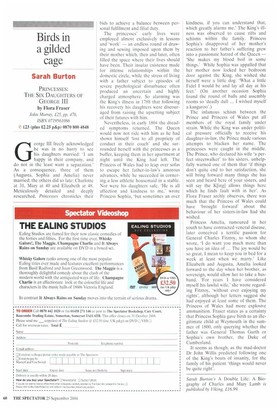Birds in a gilded cage
Sarah Burton
PRINCESSES: THE SIX DAUGHTERS OF GEORGE III by Flora Fraser John Murray, £25, pp. 476, ISBN 0719561086 "6123 (plus 12.25 p&p) 0870 800 4848 George III freely acknowledged he was in no hurry to see his daughters married: 'I am happy in their company, and do not in the least want a separation.' As a consequence, three of them (Augusta, Sophia and Amelia) never married; the others did so late: Charlotte at 31, Mary at 40 and Elizabeth at 48.
Meticulously detailed and deeply researched, Princesses chronicles their bids to achieve a balance between personal fulfilment and filial duty.
The princesses' early lives were employed almost exclusively in lessons and 'work' — an endless round of drawing and sewing imposed upon them by their mother which, then and later, often filled the space where their lives should have been. Their insular existence made for intense relationships within the domestic circle, while the stress of living with a father subject to episodes of severe psychological disturbance often produced an uncertain and highly charged atmosphere. So alarming was the King's illness in 1788 that following his recovery his daughters were discouraged from raising the upsetting subject of their futures with him.
Nevertheless, in early 1804 the dreaded symptoms returned. The Queen would now not ride with him as he had shown himself 'lost to all propriety of conduct in their coach' and she surrounded herself with the princesses as a buffer, keeping them in her apartment at night until the King had left. The Princess of Wales had to leap over sofas to escape her father-in-law's amorous advances, while he succeeded in cornering a less athletic housemaid in a stable. Nor were his daughters safe. 'He is all affection and kindness to me,' wrote Princess Sophia, but sometimes an over kindness, if you can understand that, which greatly alarms me.' The King's illness was observed to cause rifts and schisms within the family. Princess Sophia's disapproval of her mother's reaction to her father's suffering grew into a passionate hatred of the Queen — 'She makes my blood boil in some things.' While Sophia was appalled that her mother now locked her bedroom door against the King, she wished she herself were a little dog: 'What a little Fidel I would be and lay all day at his feet.' (On another occasion Sophia found the round of balls and assembly rooms so 'deadly dull ... I wished myself a kangaroo'.)
The infamous schism between the Prince and Princess of Wales put all members of the royal family under strain. While the King was under political pressure officially to receive his daughter-in-law, the Prince made various attempts to blacken her name. The princesses were caught in the middle. The Prince, who declared his wife 'a perfect streetwalker' to his sisters, unhelpfully warned one of them that 'if things don't quite end to her satisfaction, she will bring forward many things she has seen and heard here of your sisters, and will say the K[ing] allows things here which he finds fault with in her'. As Flora Fraser archly observes, there was much that the Princess of Wales could have 'brought forward' about the behaviour of her sisters-in-law had she wished.
Princess Amelia, rumoured in her youth to have contracted veneral disease, later conceived a terrific passion for General Charles Fitzroy, to whom she wrote, 'I do want you much more than you have an idea of ... The joy would be so great, I mean to keep you in bed for a week at least when we marry.' Like Elizabeth and Augusta, Amelia looked forward to the day when her brother, as sovereign, would allow her to take a husband. 'For years I have considered myself his lawful wife,' she wrote regarding Fitzroy, 'without ever enjoying my rights', although her letters suggest she had enjoyed at least some of them. The Princess of Wales had more explosive ammunition. Fraser states as a certainty that Princess Sophia gave birth to an illegitimate child at Weymouth in the summer of 1800, only querying whether the father was General Thomas Garth or Sophia's own brother, the Duke of Cumberland.
It seems as though, as the mad-doctor Dr John Willis predicted following one of the King's bouts of insanity, for the family of his patient 'things would never be quite right'.
Sarah Burton's A Double Life: A Biography of Charles and Mary Lamb is published by Viking, £16.99.


























































































 Previous page
Previous page